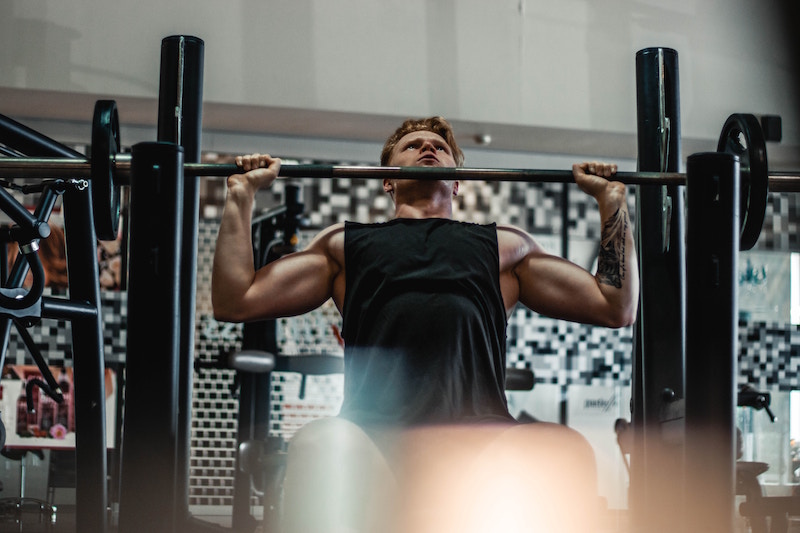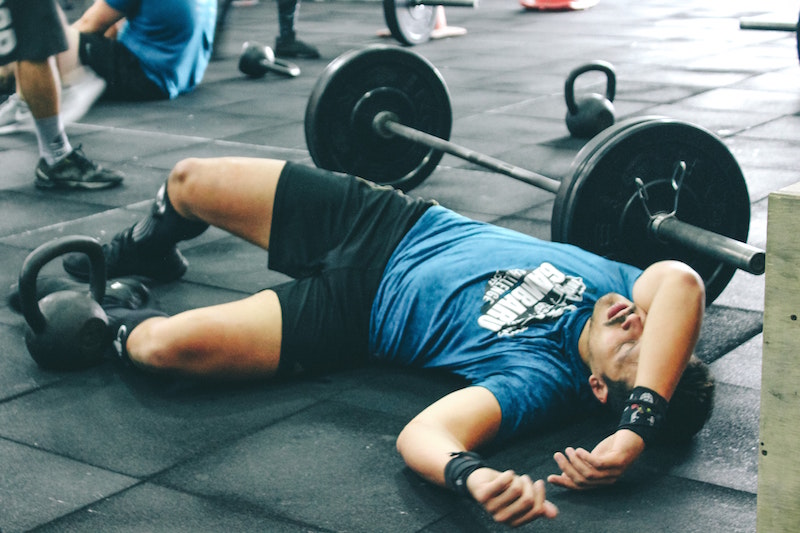
It’s bulking season!
That’s the glorious time of year when we all get to finally start eating more food, making progress in the gym again, and generally enjoying life a lot more.
But there’s nothing worse than a bulk that’s not going as planned.
You could be gaining too much fat, or worse, not getting stronger on your lifts.
If you’re bulking but not gaining strength and muscle, (aka gaining fat not muscle) there are a few key things that could be going wrong.
The biggest mistake you’re probably making is not getting enough daily protein intake or overall calories.
But there are a few other pitfalls that could be slowing your progress, too.
Let’s dive in a little deeper.
You’re not getting enough protein
I feel pretty strongly this is a big mistake a lot of people make when bulking.
You get all amped up to just eat more food (or even completely stuff your face), and you end up eating way too many carbs and fats and forget to properly track your macros.
I’m a pretty strong believer that if you’re getting enough protein every day, and lifting heavy consistently, you should be:
- getting stronger
- getting leaner
- or maybe both!
If neither of those things is happening over time, and especially if you’re gaining fat but not muscle, something is off. And it’s probably your protein.
The reason I’m keying in on this is that I was totally guilty for a long time of not getting the right amount of protein (even though I really thought I was getting plenty), and it was really holding me back!
Shoot for around .8 to 1 gram of protein per day, per pound of bodyweight.
Some people can get away with less. If you’re eating on the low end of this spectrum, try bumping it up a little bit and see if your results improve.
Now, 1 gram of protein per day per pound is actually kind of a lot. That’s why it’s so easy to under-consume.
If you weigh 150 pounds, for example, you’ll want around 120-150 grams per day.
That’s at least 40-50 grams per meal if you’re eating 3 times per day.
I’ve got a ton of great ideas for you to get more protein without increasing your calories, but here are the highlights:
- Eat leaner cuts of meat (chicken and turkey for more protein and less fat calories)
- Avoid fried foods to save calories and pack in more protein
- Stock up on high protein, low calorie options like egg whites, Greek yogurt, cod, tofu, and bone broth
Related: General undereating
It’s also possible your bulk isn’t going well simply because you’re not eating enough calories to add muscle.
Remember, you need to be in a calorie surplus to add muscle and size, for the most part.
That means you should be eating somewhere between 200-500 calories above your daily maintenance level.
(Bodyweight x 17 is a decent starting point, but you should adjust based on your own results).
If the scale hasn’t moved and your strength isn’t improving, one possible and quite likely cause is that you’re just not eating enough. This is pretty much the best news possible because now you get to eat even more with no guilt.
To recap this section:
- If your weight is staying the same or going down while bulking, you might not be eating enough calories. Try going up 200 more calories per day.
- If your weight is going up but strength isn’t improving, you’re probably adding too much fat due to low protein intake. Get more protein and fewer fats/carbs while keeping calories the same.
You’re on a bad program, or none at all

Most of us know or should know by now that the key driver or strength and muscle gains is progressive overload.
That means that, over time, you’re challenging your muscles more and more in new ways.
That can mean that over the course of a few workouts, you’re:
- Adding weight to the bar
- Doing extra reps of the same weight
- Or taking shorter rest intervals
If you aren’t consistently doing these things and tracking your progress, it shouldn’t be a surprise that you’re not getting results.
Now there are a lot of ways to go about this …
… just walking into the gym a few times a week and winging it isn’t really one of them.
You could do straight sets (meaning multiple sets with the same weight), pyramid sets (heavier and heavier sets ramping up to one top set), or reverse pyramid training (starting with your heaviest set first, then backing off the weight and adding reps).
They all work. But you should probably be on an actual program that implements one of these and stick to it.
My best advice: Write down every single set of every lift that you do, each time you step into the gym.
(I actually text myself so I always have my latest workout on my phone.)
When you know exactly what you did last time in the gym, you know that you should come in next time and push to:
- Go heavier
- Do more reps
- Take shorter rests between sets
When you just walk in and lift based on how you’re feeling without a system in place, it’s a lot harder to stay motivated and keep making progress.
If you’re interested, check out my absolute favorite bulking program for staying lean and getting strong.
Related: You’re using bad form
If you’re going to the gym and pushing as hard as you can on every exercise but still not making progress, consider if you’re actually doing the exercises right with proper form and range of motion.
It can be difficult to make progress on certain lifts when you’re constantly cheating, meaning:
- You’re not doing the full range of motion
- You’re using too much momentum
- You’re cheating with form (butt off the bench, for example)
A good practice every now and then is to deload, or drop your working weights by 10-20% or so, and build your way back up while making sure your form is on point.
Deloads have the added benefit of giving your body a much-needed break and improving your recovery.
Which leads us into…
Your recovery is off

If you are:
- Going to the gym frequently
- Lifting heavy, with consistency
- Using good form
- Tracking your progress
- Eating in a surplus and gaining weight
- Getting the right amount of protein
But still not making progress?
Something else is off, and it’s most likely the way you’re recovering after your workouts.
There are a ton of ways to screw up, even after you’ve done EVERYTHING above exactly right.
Here are a few common places people derail their bulking phases:
- They don’t sleep enough (shoot for 8 hours a night, at least!)
- They drink way too much alcohol (drinking in moderation is fine, but getting annihilated after a big gym day will completely set you back)
- They push too hard and workout too frequently (each muscle group needs around 48 hours to recover from a workout. Hitting biceps 4 times per week isn’t going to do you any good unless you’re on steroids)
If that sounds like you, these mistakes could be hurting your gains.
Take your recovery a little more seriously and you might start to see better results! Take rest days after big workouts, and do some light cardio or walking to keep your blood flow moving.
Get some high-quality foods in you, get some sleep, and don’t have 14 gin and tonics the night after you hit the gym.
Related: You’re being impatient / your expectations are too high
I know how these workout programs go.
They make it sound SO easy to just add 5lbs to the bar every single time you step into the gym.
So when you’re not able to do that, you can feel like a failure.
But the truth is that gaining muscle is rarely that simple. You’ll have bad days. You’ll have weeks where you just don’t feel as strong as you should.
You’ll slip up on the diet, or the alcohol, or the sleep. Or you’ll push too hard and use bad form to hit a new PR.
This stuff happens.
If you’re bulking but not gaining strength and it’s only been a few weeks, give it a little more time to play out.
Make sure you’ve addressed all the issues above and just stick with it, give it some more time.
Another tip if you’re stuck and starting to feel deflated: Rotate your lifts.
- Switch to dumbbells
- Try a new variation
- Or do something entirely different for each muscle group.
You’ll probably start making progress again and it will be a lot more fun.
BONUS: You’re not lifting to your actual strength potential
I recently had a massive realization in the gym, and it explained why I kept running into major plateaus.
I wasn’t warming up enough before my big lifts, and therefore I wasn’t lifting as heavy as I could.
When you aren’t lifting to your full strength potential, it doesn’t matter what you’re eating — you won’t gain muscle because you’re not forcing your body into progressive overload!
If you think this could be a problem for you, try switching up your warm-ups.
If you’re warming up so much that you’re heading into your work sets already fatigued, dial it back substantially and see if that helps.
If you’re under warming up (like me), try adding in more ramping sets before your work sets on big lifts. A formula I like is:
- 10 reps with the bar
- 8 reps with 50% of work set
- 5 reps with 75% of work set
- 3 reps with 85%
- 1 rep with 95%
I’ve even experimented with 1 rep at 100% and seen good results.
Pro tip: If your second work set feels way better and easier than the first, that’s a good sign you weren’t warmed up enough and your muscles weren’t primed for maximum recruitment!
Wrapping Up
Bulking should be fun, no doubt about it.
You get to eat more food, and you should see your performance in the gym improve. That’s all super motivating.
But just because you’re “bulking” doesn’t mean you’ll automatically pack on tons of muscle and strength. There are a lot of areas where things can go wrong.
The most common problems during a bulk are:
- Not getting enough protein (or undereating in general)
- Not tracking progress (or using bad form to hit PRs)
- Not recovering properly (or just being impatient)
Look at these areas first if you’re having trouble on your bulk.
I believe firmly that most people are drastically overestimating how much protein they eat, and probably need to make a concerted effort to get a little bit more without bumping their calories up too much.
I hope this helps! And at least you should know that, no, you’re not the first person to have difficulty getting stronger even though you’re eating more.
It happens! And there are lots of ways to fix it.
Good luck to you.